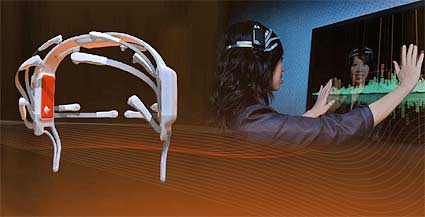First Brain-controlled Video Gaming Headset Unveiled
San Francisco (CA) - Emotiv Systems today unveiled the EPOC, a neuroheadset that allows users to control gameplay simply with their thoughts. IBM said that it is looking for ways to extend the EPOC beyond games into enterprise business markets.
In 1982, Clint Eastwood played Mitchell Grant, who is sent to the Soviet Union to steal Firefox, a revolutionary plane that, among other sci-fi features, allowed the pilot to control the jet's weapons simply with his thoughts. 25 years later, it looks like the brain-controlled helmet is making its way to the mass market, albeit in a less military way.
Emotiv said that the EPOC is advanced enough to detect more than 30 different expressions, including immersion, excitement, meditation, tension and frustration; facial expressions such as smile, laugh, wink, crossed eyes, shock (through raised eyebrows), anger, horizontal eye movement, smirk and grimace (through clenched teeth). The device is also able to detect cognitive actions such as push, pull, lift, drop and rotate (on six different axis) as well as a "completely new category of action based on visualization, the first of which is the ability to make objects disappear."
The manufacturer is using "non-invasive" electroencephalography to monitor electrical impulse emitted by about 100 billion neurons in the brain. "Brain computer interface technology works by observing an individual's electrical brain activity and processing it so that computers can take inputs from the human brain," Emotiv said.
As a result, games will be able to respond dynamically to player emotions, Emotiv said. The company promises that players can more easily control certain actions and expressions and manipulating objects in the game using their brains instead of a keyboard or controller. In addition to these detections, the Emotiv EPOC comes with a gyroscope, which enables the camera or cursor to be controlled by head motions.
The headset is expected to ship late this year and carry a suggested retail price of $299.
IBM apparently has jumped on Emotiv's idea already, saying that it will explore the potential of the technology into more strategic enterprise business markets and virtual worlds. Besides making these environments more "personal, intuitive, immersive and ultimately more lifelike", IBM envisions applications such as virtual training and learning, collaboration, development, design and sophisticated simulation platforms for industries such as enterprise and government.
Get Tom's Hardware's best news and in-depth reviews, straight to your inbox.

Wolfgang Gruener is an experienced professional in digital strategy and content, specializing in web strategy, content architecture, user experience, and applying AI in content operations within the insurtech industry. His previous roles include Director, Digital Strategy and Content Experience at American Eagle, Managing Editor at TG Daily, and contributing to publications like Tom's Guide and Tom's Hardware.
